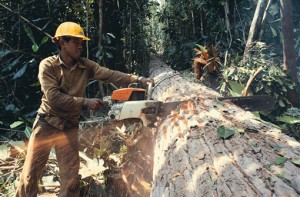Deforestation, and the Incentivized Eco-Crime of Indonesia

(Stockbyte)
There are books that governments keep officially, and then there are the other books – accounts of what people are actually doing and profiting from that are never mentioned in any legal context. A team of researchers from MIT, the University of Maryland, the London School of Economics and the World Bank cleverly used MODIS satellite imagery to uncover this kind of discrepancy as they investigated deforestation in Indonesia.
The satellite pictures allowed for comparison of legal and illegal logging operations. What they found (and write about in a new paper for NBER) shows how an increasingly decentralized government, coupled with very real monetary incentives for local officials, leads to eco-crime.
Indonesia contains one of the largest pieces of tropical forest in the world, rivaled only by Brazil and Congo. It’s also the third largest producer of greenhouse gases behind the U.S. and China, due largely to its “forest extraction” practices. The paper examines three main forces that affect the decision-making and corruption of bureaucrats and government officials in charge of the logging-heavy jurisdictions of Indonesia. These include the timing of local elections, the quantity of jurisdictions in a given area, and the availability of alternative sources of “rent” for officials.
Popular Elections: In 2005, Indonesia changed a crucial part of its electoral process. Formerly selected by the local legislatures, district heads became popularly elected. These elections created a political logging cycle that didn’t exist under former president Suharto’s strong central government, so that the amount of pre-election logging increased to as much as 42% in an election year.
More Jurisdictions: Indonesia has increased the number of political jurisdictions from 146 districts in 1998, to 311 districts in 2008. Researchers found that adding one more district to a province increases the deforestation rate by 7.8%. Why? In essence, it made room for more people to make more money off of preexisting natural resources. The addition of another district also drives down the price of wood (as there are suddenly more suppliers,) fueling the cycle further.
Sources of Revenue: If a politician has other “rents” to fall back on besides money from logging, such as oil and gas revenues, he is much less likely to participate in the same amount of eco-crime as his oil and gas-poor counterparts.
The authors stress how illegal behavior can be explained through economic models:
The results in this study provide new evidence on how potentially corrupt bureaucrats and politicians respond to incentives. All three of the main results in the paper are consistent with rent maximization by local officials: as an official’s market power diminishes (due to district splits), he increases the rate of rent extraction; as his discount rate increases (due to an upcoming election), he increases rent extraction; and, as alternative sources of rents increase (due to increased oil and gas revenue), so that he has more to lose from being found engaging in illegal activity in the forest sector, he decreases rent extraction. The results thus provide an example of how potentially illegal behavior can be explained by standard economic models (as in Becker and Stigler 1974, Shleifer and Vishny 1993, and Olken and Barron 2009).
Trying to confront problems of global deforestation, then, is a matter of aligned incentives, as well as a door to door battle with small governments, not big ones.

Comments